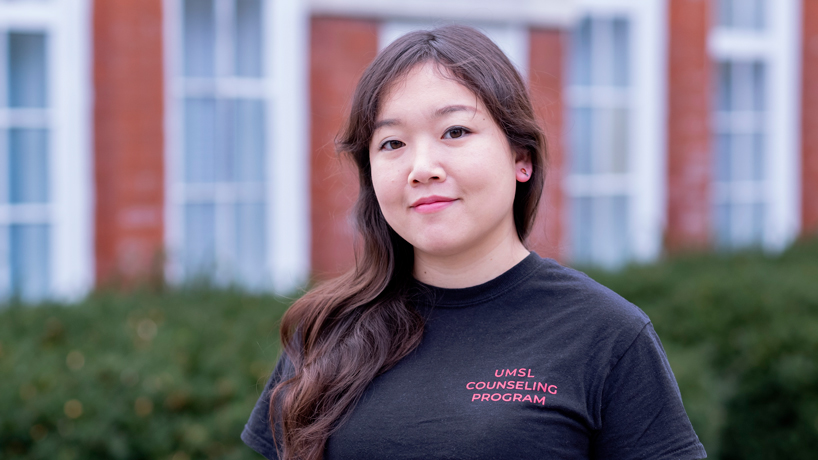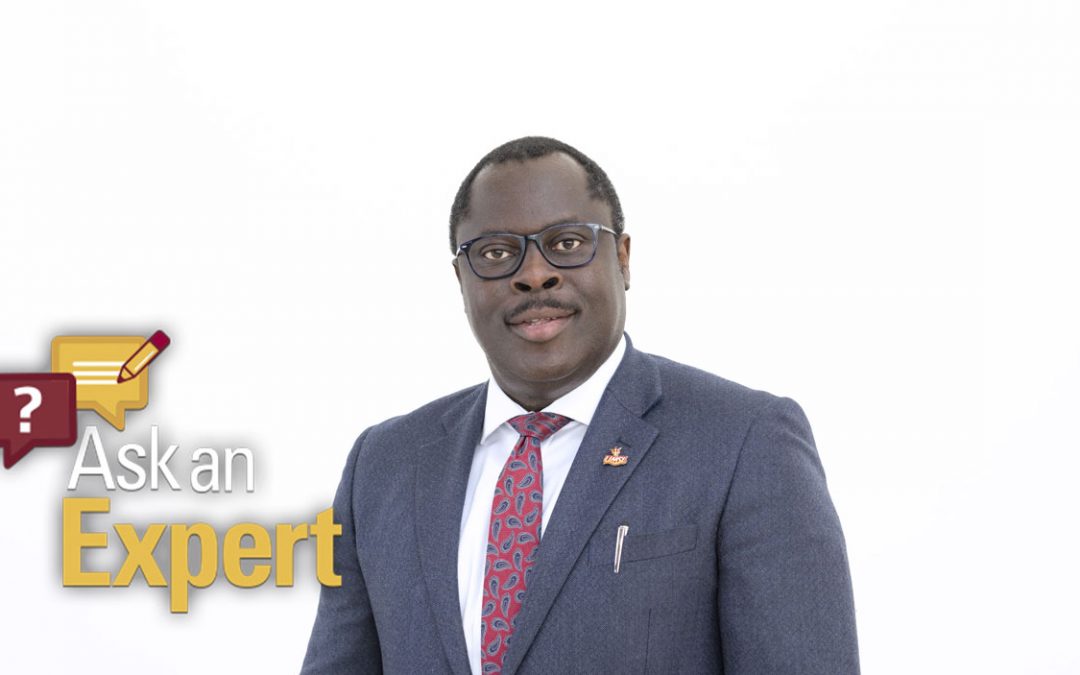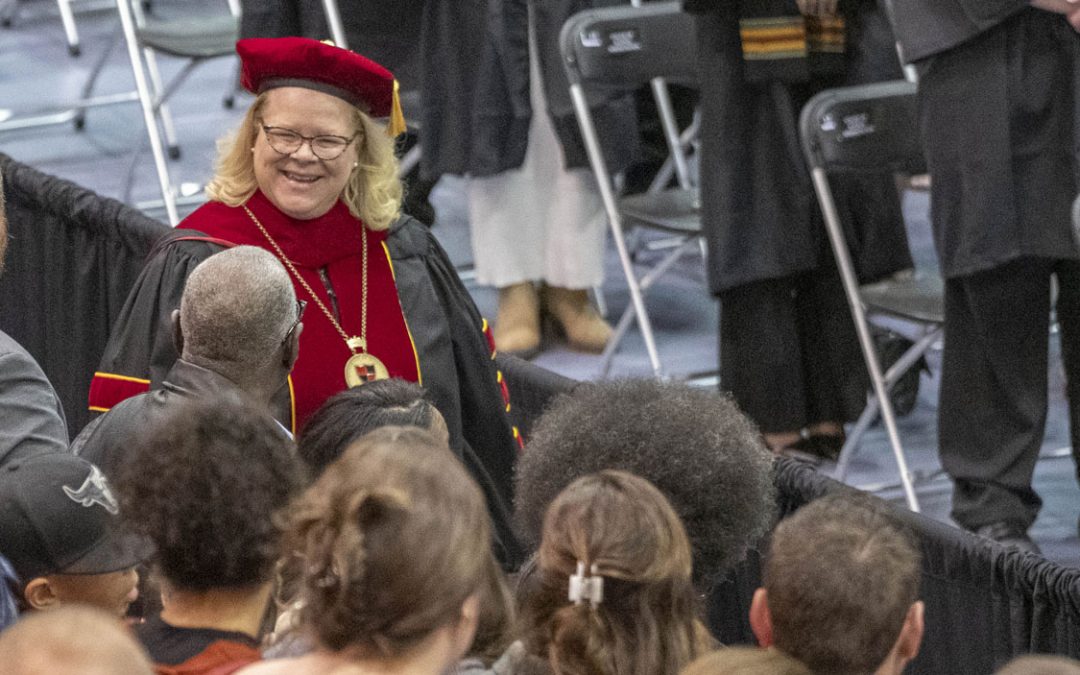
Yuima Mizutani defended her dissertation, “Searching for a ‘Home’: Examining the Experiences of Confucius Asian College Students with Third Culture Kid Backgrounds,” and will graduate from UMSL this month with a PhD in counseling. Mizutani’s dissertation focused on how third culture kids from Asian countries with Confucian traditions develop a sense of belonging in college. (Photo by August Jennewein)
Like most 9-year-olds, Yuima Mizutani spent her birthday at a party with cake. But most children don’t get a passport or travel 6,000 miles to blow out the candles.
The celebration was one of most memorable moments from her overseas trip to visit a friend in the United States, even if the cake was a bit sweet for her liking.
“That was a pretty significant experience for me,” Mizutani said. “I was at a young age and came to a different country and didn’t understand any English.”
It had an undeniable impact on her future and sowed an early fascination with other cultures and international populations.
Mizutani explored that lifelong interest in her doctoral dissertation on the identities of Asian college students with “third culture kid” backgrounds, or adolescents who spend the majority of their childhoods outside of their home countries. After successfully defending her dissertation, Mizutani will graduate from the University of Missouri–St. Louis this month with a PhD in counseling.
“It’s a really weird feeling, I have to say,” she said. “I haven’t really caught up to the emotions yet.”
Mizutani’s interest in other cultures can also be traced back to her unique upbringing in Yokohama, Japan. She was raised as a Christian – a small community in the country, estimated at around 1 percent of the population.
Despite modest numbers, her church attracted international people living in Japan, as well as Japanese citizens of mixed heritage. It made for a diverse group of friends growing up, including Americans, Korean-Japanese, Singaporeans and Zimbabweans.
By socializing with them, Mizutani was exposed to new cultures regularly. Her childhood friends from her church attended an international school and introduced her to the concept of third culture kids. Though she’s Japanese, Mizutani felt a kinship to third culture kids as the member of a minority community in a country that often prizes conformity.
“That made me feel interested,” Mizutani said. “I was struggling to find my identity and a connection because I was raised as a Christian where not many people are Christians. I was trying to find my connection with other people, and that’s where I came across this term third culture kids.”
Mizutani’s interest continued to develop as she got older, especially after she returned to the U.S.
As an undergraduate, she participated in an exchange program with UMSL. The experience convinced her to apply to American universities for graduate school.
“I applied to a few other institutions for the master’s degree,” Mizutani said. “But UMSL was one of my top universities. I wanted to come back, so thankfully they took me in.”
She graduated from UMSL with an MEd in counseling, specializing in clinical mental health, and has gone on to work in the counseling center at another local university. In her position, she’s advocated for the mental health needs of international students, third culture kids, immigrants and refugees.
Her PhD dissertation, “Searching for a ‘Home’: Examining the Experiences of Confucius Asian College Students with Third Culture Kid Backgrounds,” is an extension of those efforts. The study focused on how third culture kids from Asian countries with Confucian traditions – China, Hong Kong, Japan, Singapore, South Korea and Taiwan – develop a sense of belonging in college.
All third culture kids face challenges due to their unique backgrounds, including identity development, lack of connection with their home countries, post-traumatic stress disorder and more. But those from Confucian Asian countries face additional complications because their cultures value collectivism and cohesiveness above individuality – things that might put them at odds in other countries.
However, in academia and media, the topic is still largely viewed as a Western or European phenomenon.
“Limited studies are conducted outside of European, Western countries,” Mizutani said. “I think it was very significant to hear them talking about their struggle with Asian identity versus their third culture kid identity. I didn’t feel like I actually had that idea before coming to this, starting this research.
“I felt like my understanding was that third culture kid identity was such a big thing, but it turned out Asian third culture kids especially felt like their Asian cultures were equally important.”
When these students didn’t find others with similar backgrounds in college – like they would have at an international high school – they tried to connect to their heritage through Asian student organizations. Though a sense of belonging was elusive in those organizations, as well.
Mizutani said many started to value their identity as “world citizens,” instead.
“I felt like it was important for them have some identity, the label to explain or define that it is OK to have multiple identities,” she said. “You don’t have to be this or that. You can be both or maybe more. Talking with my participants, it felt like it was so important for them.”
She noted that it’s also important for university officials to be understanding of students who are struggling with identity complications in addition to language and cultural barriers.
“It’s important to give extra explanation for students and open the door so they can reach out to faculty members,” Mizutani said. “Counselors need to do more in-depth multicultural focused conflict intervention, too. Make sure they understand the struggle and don’t assume. Apply a really empathetic approach for these populations.”
At some point, Mizutani wants to teach future counselors to do just that.
“I want to be a professor in a counseling program,” she said. “I love to teach multicultural counseling. That’s actually one of the reasons I came to the U.S. I was advised to go to Australia and Canada. They also have good universities, but America has a unique, diverse culture here. That’s something I was always interested in, and I think the world is getting smaller and smaller because of technology developments. So, I think this field and this topic is particularly important.”














